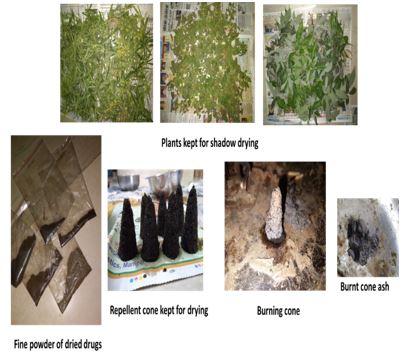Formulation and evaluation of Herbal Mosquito Repellent in two forms used in folklore practise
DOI:
https://doi.org/10.21760/jaims.8.3.6Keywords:
Mosquito repellent, plant extract, herbal repellent, non-toxic, human healthAbstract
Mosquito borne diseases including malaria, dengue, filariasis, and chikungunya cause serious health hazards across the world. Several mosquito repellents are currently in the market; however, most of these are not efficacious and eco-friendly. Recently, considerable research progress has been made to develop more pleasant, effective, and non-toxic to other species using herbal oils and formulations. Also, these herbal compositions are easily available and economic. Although, this existing herbal composition has been demonstrated to be effective and non-toxic to humans, they are more volatile and short lifespan of these compounds has necessitated further development of plant originated pesticides as alternative to chemical pesticides. In the current study, we have developed the various herbal formulations and showed that these formulations are effective mosquito repellents. The survey further showed that these repellents are pleasant with minimum allergic reactions.
Downloads
References
Brown, Lesley (1993). The New Shorter Oxford English Dictionary on Historical Principles. Oxford [Eng.]: Clarendon. ISBN 978-0-19-861271-1.
Carney, Ryan M., et al. "Integrating global citizen science platforms to enable next-generation surveillance of invasive and vector mosquitoes." Insects 13.8 (2022): 675
Singh, Bhoopendra, Prakash Raj Singh, and Manoj Kumar Mohanty. "Toxicity of a plant based mosquito repellent/killer." interdisciplinary toxicology 5.4 (2012): 184-191.
Knowlton, J. and S. Pearce. Handbook of Cosmetic Science and Technology. Elseveir Science Publications, 1993.
H. O. Lawal, et al., /Journal of Natural Products, Vol. 5(2012):109-115
Rani, Nandini, et al. "Study of Citronella leaf based herbal mosquito repellents using natural binders." Current research in Microbiology and biotechnology 1.3 (2013): 98-103.
Sritabutra, Duangkamon, and Mayura Soonwera. "Repellent activity of herbal essential oils against Aedes aegypti (Linn.) And Culex quinquefasciatus (Say.)." Asian Pacific Journal of Tropical Disease 3.4 (2013): 271-276.
Das, N. G., et al. "Evaluation of botanicals as repellents against mosquitoes." Journal of vector borne diseases 40.1/2 (2003): 49.















